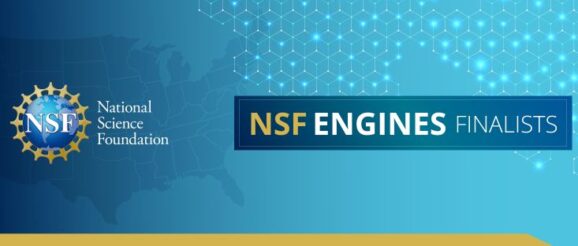NSF Regional Innovation Engines program selects 16 teams for the final round of competition

The U.S. National Science Foundation announced 16 finalists for the first-ever NSF Regional Innovation Engines (NSF Engines) competition, spanning a range of key technology areas and societal and economic challenges highlighted in the “CHIPS and Science Act.” The NSF Engines will link up with local and regional partners to expand innovation across the nation and create collaborative and inclusive technology-driven innovation ecosystems. As with the announcement of the NSF Engines semifinalists earlier this summer, NSF is releasing the list of finalists to transparently encourage participation and teaming among diverse organizations to foster innovation and regional growth. View a map of the NSF Engines finalists on the NSF Engines website.
“These NSF Engines finalists demonstrate strong promise to become emerging hubs of innovation for our nation. NSF Engines harness the talents and resources to advance our vision to create opportunities everywhere and enable innovation anywhere”
– NSF Director Sethuraman Panchanathan
The NSF Engines program is anticipated to be transformational for the nation, ensuring the U.S. remains globally competitive in key technology areas for decades to come. NSF anticipates announcing the NSF Engines awards this winter, with each awardee initially receiving about $15 million for the first two years. Each NSF Engine could receive up to $160 million over 10 years; actual amounts will be subject to a given NSF Engine’s status and overall progress, as assessed annually.
Over an up to 10-year period, an NSF Engine is expected to progress through three phases: nascent, emergent and growth. When successful, an NSF Engine will lead to its region becoming a nationally renowned, self-sustaining, technology- and innovation-driven hub of economic activity for the topic in which it specializes. The finalists being announced today will likely position themselves within the nascent and emergent phases.
“These NSF Engines finalists demonstrate strong promise to become emerging hubs of innovation for our nation. NSF Engines harness the talents and resources to advance our vision to create opportunities everywhere and enable innovation anywhere,” said NSF Director Sethuraman Panchanathan. “NSF welcomes regional and local organizations to reach out to these finalists and contribute their ideas, talent and resources to create vibrant innovation ecosystems all across our nation.”
NSF initially narrowed the NSF Engines proposals to 34 semifinalists in June. NSF assessed each of the 34 semifinalist teams on their proposed leadership’s ability to rapidly mobilize regional assets and partners in an inclusive manner; their competitive advantages; and the budgets and resources for their planned use-inspired and translational research and development as well as workforce development efforts. The finalist teams will be interviewed in person later this summer and fall to assess risks, resources and a given team’s ability to adapt to changing circumstances.
The role of the NSF Engines’ partners will be a key component of the selection process at this stage. Through this announcement, NSF offers a clarion call to regional constituents within each finalist’s region of service to support the teams by increasing or reinforcing their commitments to support the proposed activities.
Launched by NSF’s Directorate for Technology, Innovation and Partnerships (TIP) and authorized by the “CHIPS and Science Act,” the NSF Engines program uniquely harnesses the nation’s science and technology research and development enterprise and regional-level resources. NSF Engines aspire to catalyze robust partnerships to positively impact the economy within a geographic region, address societal challenges, advance national competitiveness, and create local, high-wage jobs across the country. The announcement of NSF Engines finalists expands upon the 44 NSF Engines Development awards announced in early May and the semifinalists announced in June.
“We congratulate the NSF Engines finalists for making it to this stage of the first-ever NSF Engines Award competition,” said Erwin Gianchandani, NSF assistant director for TIP. ” Importantly, the teams and their regional partners will be asked to demonstrate how their work will play a catalytic role in accelerating the growth of their regional innovation ecosystems. Teams are expected to amplify the impact of existing investments into the region and attract increasing levels of investments from industry, venture capital, government and other sectors over time.”
More information can be found on the NSF Engines program website.
NSF Engines Finalists*
Advanced Agriculture
Advanced Manufacturing/Building Construction
Advanced Materials
Aerospace
Bioeconomy
Blue Economy/Circular Economy
Climate and Resilience
Health & Wellness
Microelectronics and Semiconductors
Quantum
Sustainable Energy
Water Sustainability
*Finalists are grouped by topic and listed within each topic in alphabetical order by organization name.
